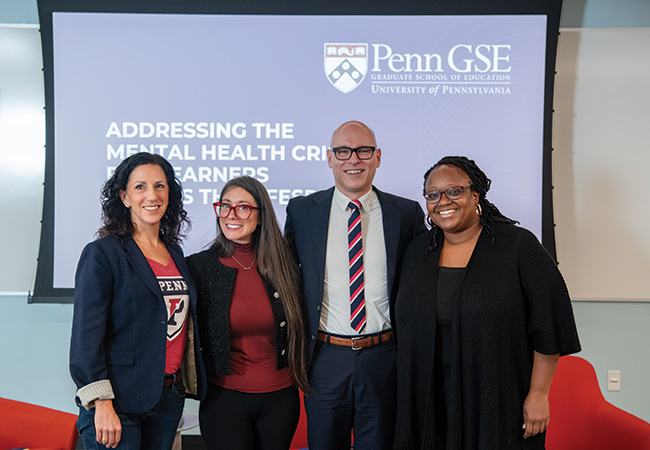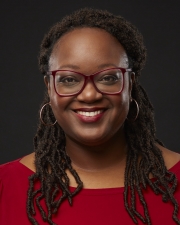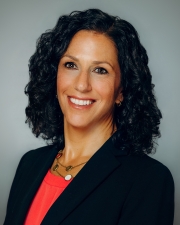Mental Health Crisis Takes Center Stage at Homecoming Panel

Dean Katharine Strunk, from left, Noémie Le Pertel, Benoit Dubé, and Ariane Thomas are pictured after their Homecoming panel. Photo by HKB Photo.
Every year at Homecoming Penn GSE welcomes back alumni and friends for a panel discussion on a critical topic in education. Following months of headlines about “quiet quitting,” post-COVID loneliness and student-achievement effects, and social media’s impact on depression and anxiety, this year’s focus on mental health felt fitting.
On Nov. 4, Dean Katharine Strunk led a discussion titled “Addressing the Mental Health Crisis for Learners Across the Lifespan” with three Penn-affiliated experts. Benoit Dubé, Penn associate provost and chief wellness officer, provided insights in higher education. Ariane Thomas, a licensed clinical psychologist who directs Penn GSE’s Professional Counseling Program, spoke about the K-12 space. Lastly, Penn GSE alumna Noémie Le Pertel, CEO of the Institute for Global Flourishing, provided expertise about workplace wellness.
The event, which was held in the new active learning classrooms in the GSE building expansion, kicked off with a lively discussion of whether or not it is even accurate to describe the current climate in mental health as a “crisis.” The panel took its name from recent comments made by U.S. Surgeon General Vivek Murthy, who called mental health “the defining public health crisis of our time.” But Dubé said the label could be harmful.
“We’re actually scaring away people who could be part of the solution, who will falsely believe that because this is a crisis, you need to have special training in order to help resolve the challenge that plagues everyone,” he said.
Though his fellow panelists were more open to using the word — Thomas said words like crisis and trauma have moved from the clinical lexicon to everyday parlance as “we, in the last few years as a global human race, have shared some crises, have shared some trauma” — they agreed that, across education and workplaces, everyone has a part to play in the community of care.
“I take [the use of those words] as an opportunity to respond, not clinically, but communally,” said Thomas, “to show up for people, to listen, to hear, to find empathy. … Pain is universal. Suffering is universal. Being able to understand that helps us to have a sense of everybody’s humanity. It lets us show up without a bunch of letters after our name, just as human beings, to care for the people around us.”
Le Pertel said that it is people’s job to hold space for one another in their families, communities, educational institutions, or workplaces. “It’s not just a place we pick up a paycheck,” she said. “It’s a place where people — especially young people entering the workforce — are expecting to fulfill higher order needs.”
Penn GSE Homecoming 2023 Panel Discussion: Addressing the Mental Health Crisis for Learners Across the Lifespan from Penn GSE Communications on Vimeo.
Some spaces are better equipped to support mental health or well-being issues. For example, K-12 schools can have counselors and teachers who are often trained in social-emotional learning. But, Dubé noted, it’s different in higher education, where teaching faculty are hired based on subject expertise and not classroom management or other related skills. However, college students may still need or expect a similar kind of mental health support from their college faculty as they received from their K-12 teachers, he said. To help with this, his office offers active-listening skills-building training called “iCare” to any member of the Penn community.
“To their credit, the School of Dental Medicine actually requires all of its teaching faculty to undergo iCare training,” he said. “So that if a dental student in the classroom brings in life worries, they are not going to simply be outsourced, [and professors] can at least be a first-line respondent, listener, and connector to resources, when and if appropriate.”
The workplace can be even less prepared to deal with people’s personal struggles. Le Pertel, whose GSE doctoral dissertation examined workforce flourishing, engagement, burnout, and mental health in more than 122 countries, said that employees aren’t encouraged to share when they are struggling. But that’s a problem. “We are all connected, and the well-being — or lack of well-being — of people translates to business outcomes,” she said. “It translates to organizational performance.”
One issue that affects the mental health of people of all ages is social media. A question from the audience pointedly asked the panel how to mitigate its harm and maximize its benefits. Thomas, a mother of a 14-year-old son, said it is all about balance, learning how to keep social media social while also spending time away from screens.
“I had to wake up and accept that this is an important part of K-12 culture,” she said. “And yet, it is a really damaging aspect — especially what we’re learning from research is that it is really harming our adolescent and pre-adolescent girls. … I try to keep some social media involved in our lives, as mother and child. … I engage with it because that’s what he and his friends do. But also, I want him and his friends to know how to engage in real life.”
There are also positive ways to engage with social media. Dubé said that his office has used TikTok to connect to students and let them know about the resources they offer. Similarly, Le Pertel said that this moment of “crisis” can also be an opportunity.
“We can seize this moment and transform our ways of being with one another,” she said, “in terms of building greater connections and resiliency, in terms of post-traumatic growth, and supporting one another through challenging times. Can we also normalize it being OK to not be OK?”


